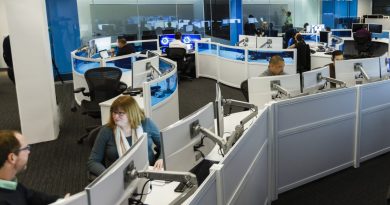How one senior developer brings the startup spirit to Microsoft

I recently had the opportunity to visit the Microsoft Africa Development Center, in my role as executive sponsor, for dedication ceremonies we hosted in both Nigeria and Kenya. All I have to say is, “Wow!” The energy at the ADC is simply electric. There’s so much optimism and so much enthusiasm for our plans to continue hiring engineers in ADC-West (Lagos) and ADC-East (Nairobi).
Spending time at the ADC reminded me of my early days at Microsoft when we were a much smaller company with a much shorter history, and I was working on a brand-new team. There’s something incredibly special about being there at the beginning, which software engineer George Maina understands first-hand. Even though he’s only been at Microsoft a couple of years, George was one of the first ADC employees, making him one of our most seasoned veterans and a leader to others who work on the Identity and Network Access team in Kenya.
No stranger to being a pioneer, George has a long and successful track record as an entrepreneur working on groundbreaking technologies for the Kenyan market. That startup spirit has served him and the ADC well—his team’s success made investing more in the ADC an easy decision. I’m so excited to see how much the center will grow over the coming months and years.
George’s interview with Igor Sakhnov has been edited for clarity and length. We’ve included some video snippets so you can learn more about his entrepreneurial history and his future aspirations for the Microsoft ADC.
Igor: George, what got you into computers? Was it something in your blood from childhood? Or was it something that happened later on?
George: When I was young there were no computers in Kenya. We didn’t even have books about them. There were no computer courses. The first time I touched a computer was in primary school. We went on a school field trip to a computer lab where they were making 3D animation games. When I saw that, I knew, wow, this is what I have to do. I got to use computers in high school and then took computer science courses at different universities. If I didn’t get the computer science course I wanted, I enrolled in a different one.
Igor: You worked for a number of startups, which is a great way to learn how a business runs. Could you share a few of your experiences?
George: I was involved with different startups from 2009 to around 2016, about seven years. While I was with the first one, smartphones were just becoming popular. We worked on something we called Taxi, which functioned like Uber. It never really took off, but I gained an understanding of how geolocation and routing work. It was a very, very good experience. There were only three of us in the company. Aside from technical matters, we had to learn how to make money and deal with customers. The customer’s always king. In the process, I got all-around exposure to both development and business.
When that startup failed, I went to another one, where we did SMS subscriptions. Our part of Africa didn’t have something like WhatsApp, and internet penetration was not as high. We sent out daily quotes, horoscopes, jokes, weather forecasts, plus political and breaking news. In all, 13 countries here in Africa participated. The experience taught me a lot about developing for scale and that type of thing. I was able to build on the knowledge I had learned from the earlier startup.
After that, I went to yet another startup called Kopo Kopo. It was a small company and went through a lot of restructuring. We were very close-knit, and I was involved in every aspect from business to technical. It’s actually a Seattle-funded startup that does mobile money processing. At the time, it involved five countries, but I think Kenya was the biggest. Mobile money is still growing here in Kenya and Kopo Kopo has really helped. Again, we were mostly doing development. When we integrated a bank into the system, they would have their architecture, security, database, and maybe developer people attending the meeting. They’d ask, “Where are your guys?” I’d say, “I’m it.” M-PESA has grown to a point where it’s now the main way people in Sub-Saharan Africa pay for things in lieu of cash.
My experiences with startups were truly eye-opening for me: how startups work, how you work to scale, how to look for investors, and how to become profitable. I learned a lot. That’s my startup story.
From there I went to a telco, which wasn’t a startup.
Igor: So how did you wind up at Microsoft in Nairobi?
George: I’ve worked in different places and done different things, but I’ve always wanted to improve on my skills as a developer. I knew that the best people are at companies like Amazon, Microsoft, and Facebook. I’ve always wanted the kinds of challenges they represent. I always wanted to work with people who would wow me and teach me at the same time. When I heard that Microsoft had come to Kenya, I knew that “this is my chance,” so I just said, “Go for it.” I’ve learned so much. The last two years have blown my mind.
Igor: You were one of the first people to join Microsoft Identity in Nairobi when the office was still tiny. How has it changed?
George: I think we were the very first team to join Identity here, and we all came on the same day. There were then three teams at Microsoft’s Africa Development Center (ADC) in Nairobi. Each team had around seven people, making a total of 21. One team came aboard just a week before my team. At that time, it was not really clear where ADC was going. But it turned out really well. We’ve gotten our footing and have developed specialized areas. Several teams are now owners of certain operations within Microsoft. ADC has grown to around 400 just here in Kenya alone. That’s a testament to how well ADC has performed.
I remember when you came to visit, Igor, you said that you’d evaluate the operation after a few years, that it was an experiment. I remember going home that night thinking, wow, what happens if this fails?
Igor: I think it was a brilliant experiment. For me, the experiment ended a year ago when we started seeing excellent outcomes from the Nairobi office. Just talking to people, it’s really exciting to see how Nairobi comes as a team, with its own culture.
Tell us more about what you’re working on.
George: I work for the Microsoft Graph onboarding team, which was the third team to be formed at ADC. Right now, we’re four people. Microsoft Graph is like a reverse gateway. It’s an aggregator for different Microsoft services, such as LinkedIn or directory service, so that from an external point of view, it all looks like one service. Before Microsoft Graph, different teams would publish their own APIs that weren’t consistent. Now all Microsoft services communicate with apps using Graph.
We help teams within Microsoft to onboard onto Graph and to manage their Graph deployments. Whenever they need to make changes, we do the deployment for them. We validate their schemas, give feedback to ensure they’re complying with what Graph expects, and ensure that documentation is published properly. My role is to develop tooling to make sure we can automatically link their API when they publish it to our repo.
Igor: I think your team is fully located in Kenya, meaning, you don’t have anyone in Redmond working on your area, right? You drive onboarding completely on your own.
George: We do get help from people in Redmond, but the charter for onboarding developers to Microsoft Graph is fully ours. I think it’s sort of both a blessing and a curse. It’s a blessing in the sense that we get to completely own it, but a curse in the sense that sometimes we’re stuck. When you’re on your own, there’s nobody you can ask.
Igor: But you need to have your blessings and your curses. To me, you’ve shown everyone that you can take on the big tasks and own them solely in the country. As the first cohort of hires into Microsoft, you’re among the most senior people in the office right now. So, I think all doors are open in front of you and you absolutely have full support from us for future growth of ADC.
So, what does your future look like? What do you want to do next?
George: I love working here and really love Microsoft. Microsoft offers so many opportunities everywhere. That’s the beauty of it. Unlike some companies I’ve worked for, where real growth is limited, at Microsoft, there are so many opportunities where you can grow and go into different things. Personally, I like personnel management, right? And I like tech, which basically drives innovation. I feel that as an individual contributor you are limited to how much impact you can have, but as a manager, you can have broader and broader impact and maybe transform more lives. It’s like running a small startup within a big organization.
Igor: Perfect. Okay, George, it was really awesome to catch up with you again, and I’m really looking forward to the day when we meet in person again.
Learn More
Learn more about Microsoft identity and access management.
To learn more about Microsoft Security solutions, visit our website. Bookmark the Security blog to keep up with our expert coverage on security matters. Also, follow us at @MSFTSecurity for the latest news and updates on cybersecurity.
READ MORE HERE



